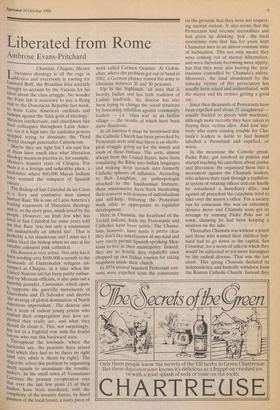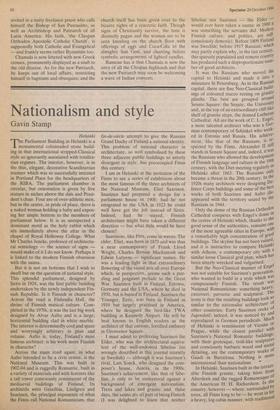Liberated from Rome
Ambrose Evans-Pritchard
Chamula, Chiapas, Mexico Liberation theology is all the rage in Mexico and everybody is rooting for Leonard Boff, the Brazilian friar recently brought to account by the Vatican for his ideas about the class struggle. No wonder the Pope felt it necessary to pay a flying visit to the Dominican Republic last week, to warn Latin American cardinals and bishops against the 'false gods of ideology'. Mexican intellectuals, and churchmen like their colleagues throughout Latin Amer- ica, say it is high time the capitalist powers stopped trying to dominate the Third World through paternalist Catholicism. Maybe they are right but I am sure few of them have much idea what liberation theology means in practice in, for example, Mexico's frontier state of Chiapas. For them it is a foreign and unhealthy place, a backwater where 600,000 Mayan Indians have resisted the conquest of Spanish culture.
The Bishop of San Cristobal de las Casas is a fiery and combative man named Samuel Ruiz. He is one of Latin America's leading exponents of liberation theology and is, so the story goes, much loved by the People. However, an Irish Jew who has lived in San Cristobal for some years told me that Ruiz 'was not only a communist but undoubtedly an atheist too'. That is Probably a bit slanderous and I must say I rather liked the bishop when we met at his suitably coloured pink cathedral. His diocese is very active. Not only has it been sending over $100,000 a month to the thousands of Guatemalan refugees en- camped in Chiapas, at a time when the united Nations aid has been partly embez- zled by Mexican officials, it also puts out a Monthly pamplet, Caminante, which open- ly the guerrilla movements of Guatemala and El Salvador and decries the strategy of global domination of North has imperialism'. The diocese also 'las a team of radical young priests who remind their congregation just how ex- Ploited they really are, and what they should do about it. This, not surprisingly, has led to a frightful row with the feudal barons who run this backward state.
Throughout the lowlands, where the haciendas are, the peasants have seized land which they feel to be theirs by right (and very often is theirs by right). The oligarchy solves this problem by organising death squads to assassinate the trouble- Makers. In the small town of Venustiano Carranza the peasant co-operative says that over the last few years 15 of their leaders have been murdered, with the COmplicity of the security forces, by hired gunmen of the local tyrant, a nasty piece of work called Carmen Orantes. At Golon- chan, where the problem got out of hand in 1982, a German planter rented the army to eliminate between 20 and 30 peasants. Up in the highlands, an area that is heavily Indian and has little tradition of Ladino landlords, the diocese has also been trying to change the social structure by fomenting rebellion against community leaders — i.e. 'class war' in an Indian village — the results of which have been quite disastrous.
In all fairness it must be mentioned that the Catholic Church has been provoked by Protestant sects and that there is an ideolo- gical struggle going on for the minds and souls of these Indians. The sects, almost always from the United States, have been translating the Bible into Indian languages and making deep inroads into formerly Catholic spheres of influence. According to Bob Laughlan, an anthropologist attached to the Smithsonian Institute, these missionaries have been inculcating their converts with notions of individualism and self-help, fostering the Protestant work ethic so appropriate to capitalist development.
Here in Chamula, the heartland of the Tzotzil indians, both the Protestants and Catholics have been active. The Chamu- lans, however, have made it pretty clear they don't like interference of any kind and very rarely permit Spanish-speaking Mex- icans to live in their municipality. Indeed, they are so hostile they reputedly once chopped up two Italian tourists for taking snapshots inside their church.
In 1974 several hundred Protestant con- verts were expelled from the community
on the grounds that they were not respect- ing ancient custom. It also seems that the Protestants had become teetotallers and had given up drinking 'pox', the local moonshine rum that has for years kept Chamulan men in an almost constant state of inebriation. This not only meant they were coming out of mental hibernation, and were therefore becoming more uppity, but that they were also hurting the 'pox' business controlled by Chamula's elders. Moreover, the land abandoned by the unlucky victims of this persecution has usually been seized and redistributed, with the mayor and his cronies getting a good cut. •
Since then thousands of Protestants have been expelled and about 25 slaughtered usually hacked to. pieces with machetes, although more recently they have taken to flaying their victims alive. And now any- body who starts causing trouble for Cha- mula's leaders is liable to find himself labelled a Protestant and expelled, or worse.
In the meantime the Catholic priest, Padre Polo, got involved in politics and started teaching his catechists about justice and liberation. He organised them into a movement against the Chamula leaders, who achieve their rank through a tradition- al system of rotating offices and can hardly be considered a hereditary elite, and against all precedent the catechists tried to take over the mayor's office. For a society run by consensus this was an extremely divisive move and Chamula soon got its revenge by running Padre Polo out of town, claiming he had been keeping a mistress on the side.
Thereafter Chamula was without a priest and those who wanted their children bap- tised had to go down to the capital, San Cristobal, for a series of talks in which they would be subjected to yet more harangues by the radical diocese. That was the last straw. This spring Chamula declared its independence and formally withdrew from the Roman Catholic Church. Instead they invited in a nutty freelance priest who calls himself the Bishop of San Pascualito, as well as Archbishop and Patriarch of all Latin America. His faith, 'the Chiapan Orthodox Apostolic Catholic Church', is supposedly both Catholic and Evangelical — and frankly seems rather Byzantine too.
Chamula is now littered with new Greek crosses, prominently displayed as a snub to the old diocese. As for the new Patriarch, he keeps out of local affairs, restricting himself to baptisms and obsequies; and the church itself has been given over to the bizarre rights of a syncretic faith. Though signs of Christianity survive, the tone is distinctly pagan and the women are to be seen kneeling on the church floor with offerings of eggs and Coca-Cola to the almighty Sun God, and chanting before symbolic arrangements of lighted candles.
Rumour has it that Chamula is now the envy of all the Chiapan highlands and that the new Patriarch may soon be welcoming a wave of Indian converts.



















































 Previous page
Previous page